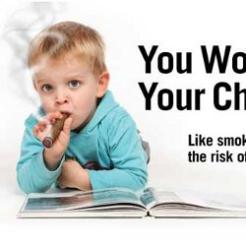Animal welfare charity People for the Ethical Treatment of Animals (Peta) has been told not to repeat the use of a poster showing a baby smoking a cigar and linking eating meat to cancer.
The poster features a baby smoking a cigar with the words “You wouldn’t let your child smoke. Like smoking, eating meat increases the risk of heart disease and cancer. Go Vegan! Peta.”
The advert, which featured in both the UK and the US, received two official complaints to the UK’s Advertising Standards Authority (ASA). The complaints, which said that the link between eating meat and the health issues was misleading and couldn’t be substantiated, were both upheld by the regulator and the advert is now banned in its current form in the UK.
In supporting its advert, Peta submitted seven studies addressing a link between meat consumption and pancreatic and colorectal cancers and heart disease. But the ASA found that much of the research was inconclusive, focused on one type of meat, or related to too specific a demographic, for instance one study which related to postmenopausal women.
In reaching its conclusion, the ASA advised: “We considered that because the ad likened the risks associated with eating any kind of meat to the risks of smoking, consumers would understand from the ad that the connection between eating any kind of meat and the risks of heart disease and cancer had been proven beyond doubt, which was clearly not the case, and we therefore concluded that the ad was misleading.”
Another Peta ad linking meat eating to child abuse was the nineth most complained about advert in 2007, prompting 68 complaints to the ASA. However those complaints, which predominantly centred around the lack of information on the need to replace nutrients if meat is withdrawn, or that the advert trivialised child abuse, were not upheld. The ASA said at the time: "Although the campaign carried an 'anti-meat' message we decided parents were likely to understand that if a food is withdrawn from a child’s diet the nutrients that food provided should be replaced. Whilst some might find the wording inappropriate, we considered that the ad did not trivialise child abuse or mislead consumers."









